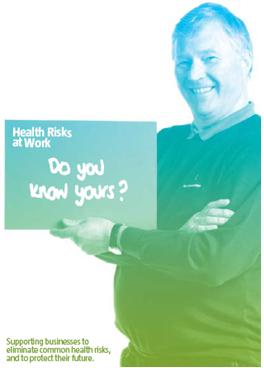Occupational health
An introduction to occupational health
For too long Occupational Health (OH) has been the 'poor cousin' in the H&S relationship, even though work related occupational health damage is a far greater problem than occupational accidents.
Often it has not been generally understood that, although 142 people died in 2014/15 as a result of notifiable occupational accidents, as many as 13,000 1 died as a result of past exposure to harmful working conditions. The costs to individuals, their families as well as to organisations and the economy as a whole are too big to ignore.
Asbestos
Asbestos is the single greatest cause of work-related deaths in the UK and is responsible for more than 84000 deaths a year 1. More than half of these cancer deaths were caused by past exposure to asbestos (either mesothelioma or asbestos-related lung cancer). The next four biggeset categories of work-related cancer were lung cancer due to silica, diesel engine exhaust and mineral oils, and breast cancer due to shift work.
Working on or near damaged asbestos-containing materials or breathing in high levels of asbestos fibres, can increase the chances of getting an asbestos-related disease.
Asbestos was extensively used as a building material in the UK from the 1950s to the mid-1980s, any building built before 2000 can contain asbestos. Asbestos materials in good condition are safe unless asbestos fibres become airborne, which happens when materials are damaged.
The Control of Asbestos Regulations prohibit the importation, supply and use of all forms of asbestos.
Read how asbestos has affect Mavis and Ray's life.
The duty to manage
The duty to manage is directed at those who manage non-domestic premises: the people with responsibility for protecting others who work in such premises, or use them in other ways, from the risks to ill health that exposure to asbestos causes. Further information on the duty to manage (HSE website)
The duty to manage asbestos is contained in regulation 4 of The Control of Asbestos Regulations 2012.
Licensing
If you are working with asbestos you will need to hold a licence. (The Control of Asbestos Regulations 2012).
Resources
Stress in the workplace
People's mental and physical health can be adversely affected by aspects of their working environment, which produce feelings of anxiety and sometimes acute distress.
More than one in four workers are affected by work-related stress in the European Union. Find out more about stress in the workplace.
Managing and reducing sickness absence
Evidence shows that work is good for health and that often going back to work can actually aid a person's recovery. On the other hand, staying off work can lead to long-term absence and job loss with the risk of isolation, loss of confidence, mental health issues, de-skilling and social exclusion.
In November 2011 the Department for Work and Pensions published Health at work – an independent review of sickness absence Dame Carol Black and David Frost CBE. The government called the review of the sickness absence system in order to help combat the 140 million days lost to sickness absence every year. The review made a number of recommendations for supporting employees at work and improving the benefits system. Find out more about managing and reducing sickness absence.
'Manual handling'
Although there has been a downward trend in the total number of work-related Muscular Skeletal Disorders over the last 10 years, there were still 553,000 reported cases in 2014/15, leading to over 9.5 million working days lost 2.
There is no cure for a damaged back and yet this message fails to get across, if people knew and truly understood this crucial fact, they would take better care of themselves and each other. This applies equally to employers, why then, do they not take their responsibilities in this matter seriously?
Occupational health and safety training
Information on RoSPA's Health and Safety training courses.
Awards
Find out more about RoSPA's Occupational Health Award – the 'Astor Trophy'.
Resources

Health Risks at Work
Health Risks at Work, promoted by SGUK provides simple, concise information to help small businesses manage common health risks.
Advice is available in the form of Rapid Reference Cards (RRC), which address five key health at work risk areas: Risks to your breathing; Risks to your skin; Risks to your muscles, bones and joints; Risks to your hearing and touch; and Risks to your wellbeing.
A free ‘Introduction to Health Risks at Work’ DVD is also available - For more information visit the Safety Groups UK website.
References
- Health and Safety Executive Annual Statistics Report 2014/15
- At a glance guide to Health and Safety Statistics 2014/15, HSE